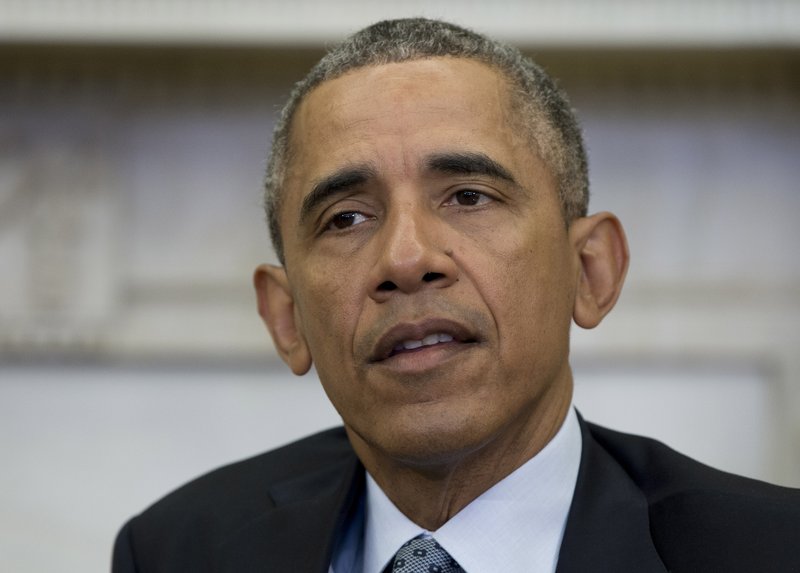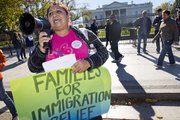WASHINGTON -- The Supreme Court said Tuesday that it is considering a legal challenge to President Barack Obama's overhaul of the nation's immigration rules.
The court, which has twice rejected challenges to Obama's health care law, will now rule on the president's plan to protect millions of people living in the United States illegally from deportation and allow them to work indefinitely in the country legally.
The justices raised the possibility of a broad decision by adding their own question to the case, asking the parties to address whether Obama had violated his constitutional obligations to enforce the nation's laws.
Obama repeatedly has taken unilateral action during his seven years in office, asserting the power of his office to sidestep Congress on gun control, gay rights, the minimum wage, contraception and climate change.
White House officials said they were pleased by the high court's decision to hear their case, and they expressed optimism that the justices would eventually clear the way for the president's actions to be carried out.
"The policies will make our communities safer. They will make our economy stronger," said Brandi Hoffine, a spokesman for the White House. "They are consistent with the actions taken by presidents of both parties, the laws passed by Congress, and the decisions of the Supreme Court. We are confident that the policies will be upheld as lawful."
But Obama's use of executive power has intensified the criticism by his adversaries, who say the president is abusing his authority.
Attorney General Ken Paxton of Texas, a Republican who is leading the challenge to Obama's immigration actions, urged the court to make it clear that no president can "unilaterally rewrite congressional laws and circumvent the people's representatives."
On Tuesday, Paxton welcomed the Supreme Court review, saying in a statement: "In deciding to hear this case, the Supreme Court recognizes the importance of the separation of powers. As federal courts have already ruled three times, there are limits to the President's authority."
In 2014, Obama ordered the creation of a program intended to allow as many as 5 million people living in the United States illegally who are the parents of citizens or of lawful permanent residents to apply for a program sparing them from deportation and providing them work permits. The program was called Deferred Action for Parents of Americans and Lawful Permanent Residents, or DAPA.
A Texas-led coalition of 26 states, including Arkansas, quickly filed a lawsuit accusing the president of ignoring federal procedures for changing rules and of abusing the power of his office by sidestepping Congress.
"DAPA is a crucial change in the nation's immigration law and policy -- and that is precisely why it could be created only by Congress, rather than unilaterally imposed by the Executive," Paxton wrote.
In February, Judge Andrew Hanen, an appointee of President George W. Bush for the U.S. District Court in Brownsville, Texas, entered a preliminary injunction shutting down the program while the legal case proceeded. The government appealed, and on Nov. 9 a divided three-judge panel of the 5th U.S. Circuit Court of Appeals, in New Orleans, affirmed the injunction.
In the event that the Supreme Court upholds Obama's actions, the White House has vowed to move quickly to set up the deferred action program and begin enrolling people before Obama's successor takes over early next year.
Democratic presidential candidates have said they would continue the program; former Secretary of State Hillary Clinton has pledged to go further than Obama to protect large groups of immigrants from deportation.
Most of the Republicans in the race have vowed to dismantle it and redouble immigration enforcement; billionaire businessman Donald Trump has proposed deporting all people who are living in the U.S. illegally.
Obama's administration has asked the court to move quickly. The court agreed, and the case is on track to be argued in April and decided by the end of June.
As is their custom, the justices gave no reasons for agreeing to hear the case, United States v. Texas.
The new case joins a docket that includes cases on abortion, affirmative action, public unions, voting rights and religious liberty. The decisions in all of them will probably land in the late spring and early summer, as the presidential election enters its final stages.
Democratic officials and immigration advocates praised the court's action. Senate Democratic Leader Harry Reid of Nevada said that "law-abiding men and women continue to live in constant fear of being separated from their children. These families must be allowed to step out of the shadows and fully contribute to the country that they love and call home."
Brenda Guigui, a U.S. citizen whose parents are undocumented, said: "My parents are ready to apply for DAPA as soon as the court lets the program begin. ... I know there are legal issues, but for us it's personal.
"Unfortunately, the national politics are ugly," she added. "Millions of immigrants have made their lives here and have children who are citizens."
An earlier program that is not being challenged, Deferred Action for Childhood Arrivals, shields migrants brought to the country illegally as children. More than 720,000 young migrants have been granted permission under that program to live and work legally in the United States.
The White House also has shifted its enforcement actions to focus on criminals, those who pose a threat to national security or public safety, and recent border-crossers.
The change means that people who are here illegally but who are not otherwise violating the law are less likely to face deportation.
About 235,000 people were deported in the federal fiscal year that ended Sept. 30, according to the Department of Homeland Security.
That was the smallest number since 2006 and a 42 percent drop since a record high of more than 409,000 in 2012.
Still, the administration drew criticism from Democrats and immigration advocates for raids this month that resulted in the arrest of more than 120 people from Central America who came to the country illegally since 2014. Those recent arrivals are not among migrants who would benefit from Obama's plan.
'Lawful presence'
In their written arguments before the court, the states acknowledged that the president has wide authority over immigration matters, telling the justices that "the executive does have enforcement discretion to forbear from removing aliens on an individual basis." Their quarrel, they said, was with what they called a blanket grant of "lawful presence" to millions of migrants, entitling them to various benefits.
In response, Solicitor General Donald Verrilli Jr. told the justices that "lawful presence" is merely what has always followed from the executive branch's decision not to deport someone for a given period of time.
He added that the consequences of allowing migrants to be lawfully present were positive.
"Without work authorization," Verrilli wrote of the people eligible for the program, "they are more likely to work for employers who will hire them illegally, often at below-market wages, thereby hurting American workers and giving unscrupulous employers an unfair advantage."
The White House administration also has said Texas and the other states don't have the right to challenge the plan in federal court.
The lower courts decided that Texas does have the right, or standing, to sue because at least 500,000 people living in Texas would qualify for work permits and thus become eligible for driver's licenses, the cost of which are subsidized by the state. "Texas would incur millions of dollars in costs," the state said in its brief to the Supreme Court.
Much of the briefing so far has been focused on the threshold question of whether the states have suffered the sort of direct and concrete injury that gives them standing to sue.
Judge Jerry Smith, writing for the majority in the appeals court, said the states had standing to challenge the program under a 2007 Supreme Court decision that said Massachusetts and other states were entitled to sue the Environmental Protection Agency over its refusal to regulate motor vehicle emissions contributing to climate change.
In that case, the Supreme Court said Massachusetts had standing to challenge the Bush administration's decision not to regulate greenhouse-gas emissions based on the harm the state would suffer from a rise in sea levels and the loss of the state's coastal land.
Smith said Texas would suffer a similarly direct and concrete injury in having to spend millions of dollars to provide driver's licenses to migrants as a consequence of the federal program.
Verrilli told the justices that Texas' injury, such as it was, was self-inflicted, a product of its own decision to offer driver's licenses to people lawfully in the United States at reduced cost.
Texas responded that being required to change its laws is itself the sort of harm that confers standing.
"Texas could avoid the driver's-license-cost injury only by changing its policy and making driver's licenses less affordable," the states told the justices. "That is itself an injury, because Texas has a sovereign interest in enforcing its legal code."
Information for this article was contributed by Adam Liptak and Michael D. Shear of The New York Times; by Mark Sherman and Josh Lederman of The Associated Press; and by Robert Barnes, Juliet Eilperin and David Nakamura of The Washington Post.
A Section on 01/20/2016


